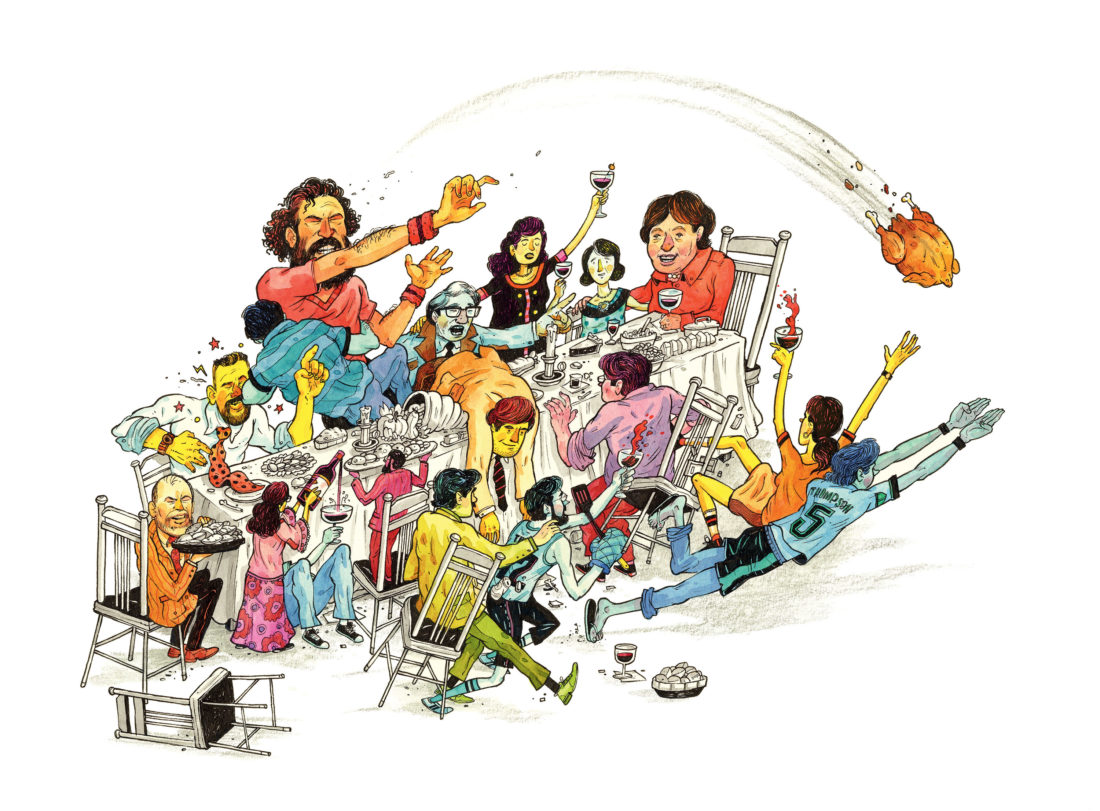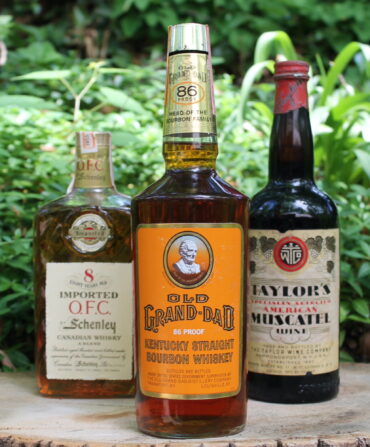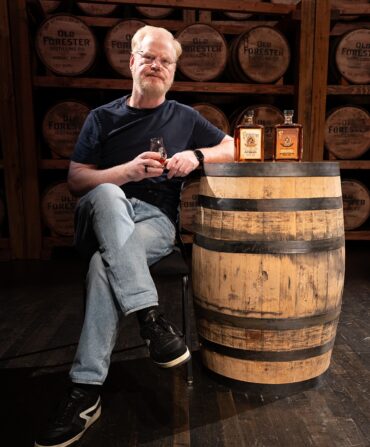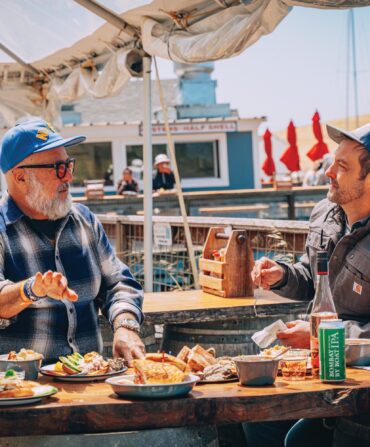My favorite moment of my favorite day of the year always plays out the same way: The Thanksgiving lunch has been served, and the coats and ties have been replaced by comfortable pants with ample elastic. My family members are making sandwiches with turkey and homemade mayonnaise or with beef tenderloin and my mother’s béarnaise, and suddenly the manic feasting downshifts to a loungy contentment. That’s when I look around at my family and feel truly thankful, for my blessings, for this chance to come together.
The Thompson Thanksgiving celebration long ago escalated from a simple familial breaking of bread into a tribal ritual of caloric excess, sweet cardiac distress, and an annual football game that borders on all-out war. An uncle broke a rib. A cousin broke his nose. There’s often blood. We award a game ball to the MVP. Here’s what I mean by escalation: Once we tossed a football around in the yard, but several years ago, we played our showdown instead on the field at Ole Miss’s Vaught-Hemingway Stadium.
The Thanksgiving blowout started when my grandmother Olga died. The four Thompson brothers wanted a way for the idea of a gathering at her home to continue in spirit—in her honor, and in their father’s honor. The feast was born, and rotated each year among the Mississippi homes of the four brothers. And don’t let my sappiness in any way camouflage the truth that gluttony and sloth are the marching orders of the day.
We eat.

John Hendrix
I cook four full beef tenderloins soaked in my father’s secret marinade. The arms of Zeus! He guarded the recipe closely, and when he died, my mother framed it and gave copies to his three brothers. I slice the steak using a carving knife I had made using wood from a collapsed barn on our family farm outside Bentonia, where my dad and his brothers grew up. My carrion-hungry cousins swarm the cutting board and brave steel to grab end pieces and little slices. In another life, Thompsons were birds of prey.
We eat West Indies salad, made with tubs of lump crabmeat just like Bill Bayley Sr.’s in Theodore, Alabama, where my grandparents ate on vacation. We make Aunt Thelma’s shrimp remoulade recipe, and Louisiana meat pies, and kibbe inspired by all the Lebanese families who settled in the Mississippi Delta. Of course there are cheese straws, because we aren’t communists. Cousin Charles brings a croker sack of oysters from the Gulf and shucks them in the backyard. There’s a traditionally cooked turkey, the missionary position of holiday eats, and another one that’s either smoked or fried. There’s dove stew and often some duck dish. Sometimes homemade smoked sausage. Deer often finds its way into a casing or onto a plate. Uncle Will likes to grill lamb chops that people eat off the grate. Salmon arrived once or twice, but I’ve never tried it.
We eat cornbread dressing, asparagus casserole, carrot soufflé, sweet potato casserole, tomato aspic, spinach casserole, jellied cranberries, and marinated mushrooms. All of which is just prelude to dessert: apple pie, shortbread with chocolate mousse, caramel cake, orange cheesecake, white cake with seven-minute frosting, strawberry cake, and my aunt Becky’s insane crack-cocaine-laced cake that should come with government warnings. Oh, and a French chocolate cake.

John Hendrix
Then come sandwiches made from leftovers and the ice-cold beer and the long unwind. People get quiet and reflective. Stories get told, the younger generation leaning in to listen. Mythology and history are nurtured and transmitted, which is really the point. I wonder from time to time about the future of those stories.
In recent years, two of my aunts have announced their retirement from hosting Thanksgiving. It’s a lot of work, and the postcoital house looks like a retreating army bivouacked in little huddles in every room. Uncle Michael and Aunt Tempe sold their house and have downsized. We’ve relied on cousins Lee and Susan the past decade to host in Oxford, but they’ve moved to Texas and sold the home where we ate so many meals. That leaves my mom in Clarksdale, who will host this year’s feast.
Is this the last one?
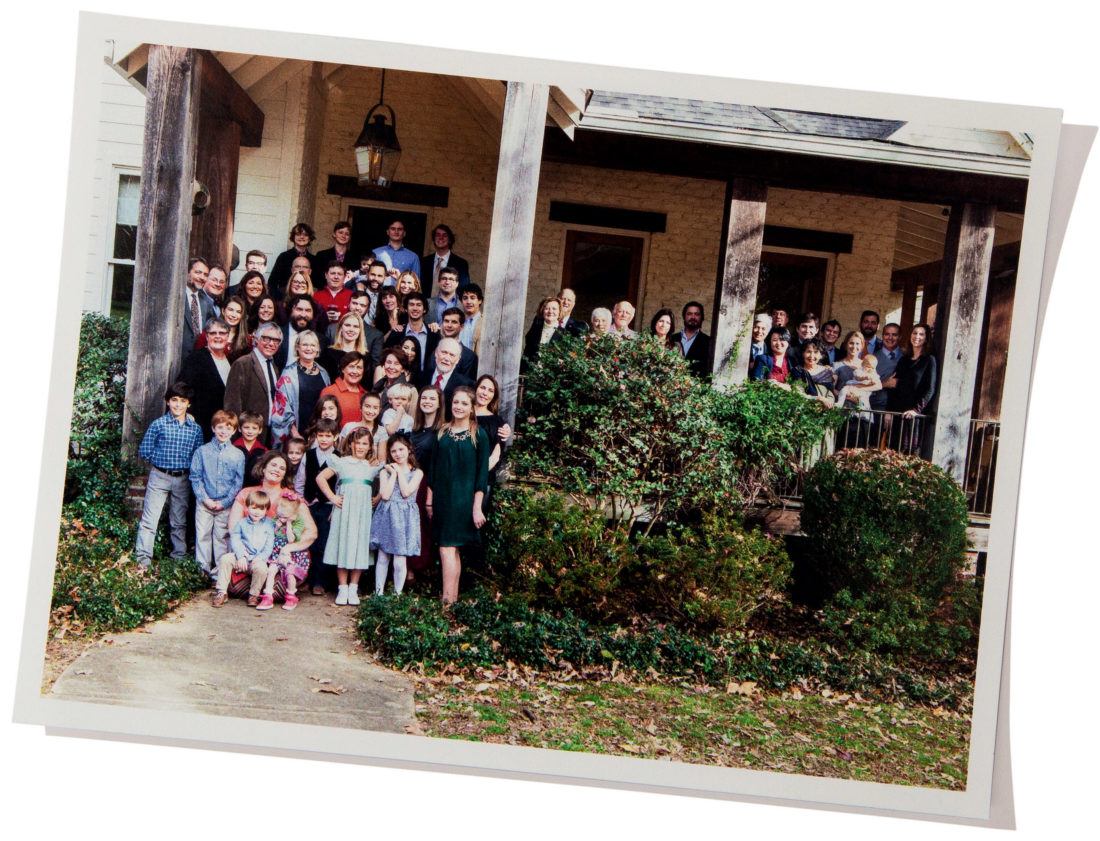
Photo: Michael Thompson Jr.
Three generations of the Thompsons, at Thanksgiving 2015.
We are in a time of transition and change, as one generation slowly gives way to the next. Two years ago, I wrote in this magazine that discussions were afoot about selling the family farm. That is happening now. The sale might be finalized before this issue prints. It’s gone. The last family celebration held there was the memorial for my cousin Miller. He loved the property’s lake and requested his ashes be spread there. We all gathered. It felt a little like Thanksgiving, without the joy. Jimmy “Duck” Holmes, the old Bentonia bluesman, came to pay his respects. He brought a protégé who sat underneath the lean-to porch roof and played the Bentonia blues.
The chords and the words felt like they were coming from somewhere deep in the earth, from the dirt itself. That farm anchored us, made an idea into something you could scoop up in your fingers. With it gone, something essential about our family’s history and mythology—and therefore our future—becomes much more fragile. This essay, then, is a selfish act, a call to arms for the next generation of Thompsons. Will we be one of those rare families who double down and strengthen our ties? Or will we slowly and quietly lose the connections that took so many generations to build? I think about those questions sometimes, at the end of a Thanksgiving Day, when I’m eating a sandwich and looking around at the people I love most in the world.
Last year, we all crowded around televisions to watch our Ole Miss Rebels play Mississippi State in the Egg Bowl. The Rebels had suffered through a brutal year, with an interim coach replacing a coach who talked Jesus but walked prostitutes.
We cheered and screamed and moaned. My uncle Will is the most ethical, moral man I know, and a medical doctor sworn to an oath, and when State’s quarterback went down to a gruesome injury, he leaped to his feet in animal ecstasy before sinking back down into his chair in shame. We all needed this victory. My wife said that when she felt all the same emotions she saw around her, she realized she’d fully accepted our family and been fully accepted herself. When it became clear Ole Miss would win, and that the night would end in a haze of joy, I sat back. My favorite moment of my favorite day had arrived. I was thankful for many things, most of all that we would do this again next year.
That is my most fervent hope, and for now that will have to be enough.


